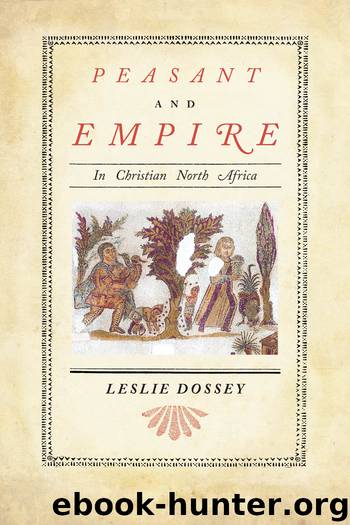Peasant and Empire in Christian North Africa by Dossey Leslie;

Author:Dossey, Leslie;
Language: eng
Format: epub
Publisher: University of California Press
Published: 2010-04-08T04:00:00+00:00
CATHOLIC “CIRCUMCELLIONS”?
The circumcellions have generally been considered a peculiarly Donatist phenomenon,78 and the most provocative sermons discussed above were by the Donatist Escorial preacher. The contrast between Donatists and Catholics should not, however, be exaggerated. Donatists and Catholics traded sermons, clerics, and congregations back and forth. The themes discussed above—the definition of true beneficia in the Lenten sermons, the Old Testament stories against debt slavery, the sermons on Zacchaeus and Daniel—were preached by both sects. The main reason we don’t hear of Catholic “circumcellions” is probably the Catholic authorship of most of our sources: the Catholics gave themselves a better press. Even so, we do find scattered references to Catholics engaging in agonistic acts against pagans.79 And Augustine’s new letters have revealed that Catholic clerics were also forcibly freeing slaves and flogging well-born magistrates for crimes against peasants. Only when they did it, Augustine did not call it sedition, but enforcing the law.
Were these incidents comparable to instances of Donatist popular violence? At first glance, they certainly do not appear to be. For one thing, the “popular” element is much less apparent. Clerics were the ones who freed slaves and flogged magistrates, not rural mobs at nundinae. This may be a false impression, however. The Catholic authors had every reason to emphasize the rustic and “mob” element behind objectionable Donatist acts and every reason to conceal anything of the same sort in their own case. A more important difference is the scant mention of scriptural authority to justify the actions of Catholics; instead we find a constant invocation of imperial law. This may also been a function of the sources; the Donatists were willing enough to appeal to Roman law when allowed to speak for themselves.80 But the difference may very well be real. Maureen Tilley has argued that it was an integral part of Donatist identity to regard the scriptures as the primary source of law.81 The Catholics ultimately prevailed against the Donatists because of their willingness to accept imperial authority over the church, and to “heal” the Donatist schism by communicating to the villages and the estates that imperial law backed the Catholic side. The “canonical texts” that Catholic clerics were communicating to the countryside were not just the scriptures, but imperial edicts and fundamental principles of Roman law. And when Augustine defended his clerics for freeing slaves or beating magistrates, he employed imperial law, not the scriptures, to do it. What has been insufficiently recognized is that this Catholic advocacy (and communication of) imperial law had the potential to undermine verecundia as much as anything the Donatists had done.
Download
This site does not store any files on its server. We only index and link to content provided by other sites. Please contact the content providers to delete copyright contents if any and email us, we'll remove relevant links or contents immediately.
| Africa | Americas |
| Arctic & Antarctica | Asia |
| Australia & Oceania | Europe |
| Middle East | Russia |
| United States | World |
| Ancient Civilizations | Military |
| Historical Study & Educational Resources |
Goodbye Paradise(3799)
Men at Arms by Terry Pratchett(2832)
Tobruk by Peter Fitzsimons(2508)
Borders by unknow(2303)
Arabs by Eugene Rogan(2292)
Pirate Alley by Terry McKnight(2218)
More Than Words (Sweet Lady Kisses) by Helen West(1860)
Belonging by Unknown(1854)
It's Our Turn to Eat by Michela Wrong(1727)
The Biafra Story by Frederick Forsyth(1653)
The Source by James A. Michener(1603)
Botswana--Culture Smart! by Michael Main(1598)
Coffee: From Bean to Barista by Robert W. Thurston(1542)
A Winter in Arabia by Freya Stark(1534)
Gandhi by Ramachandra Guha(1528)
The Falls by Unknown(1520)
Livingstone by Tim Jeal(1482)
The Shield and The Sword by Ernle Bradford(1403)
Africa: Altered States, Ordinary Miracles by Richard Dowden(1382)
